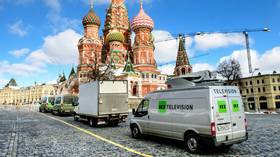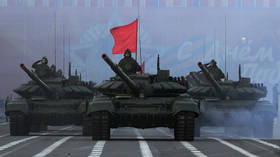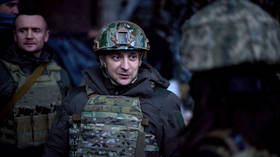Failure of American 'disinformation' revealed
Why is the US government pretending that RT is the only news outlet that makes mistakes?

A new US government report has accused RT of spreading false narratives. However, in the process, Washington officials have exposed some untruths of their own. Far from being an isolated case, it’s typical of the West’s burgeoning disinformation industry.
Whenever a new ‘threat’ appears, be it ethnic conflict, weapons of mass destruction, terrorism or anything else, the coffers of government open up, and funds pour into state organizations, think tanks and private ‘experts’ in an effort to dissect the problem in question. That process rests on the assumption there is a problem. Consequently, the industry dedicated to it invariably favours the idea that it exists. Furthermore, an element of self-selection means that people who believe the problem is serious predominate over sceptics. The result is a tendency towards threat inflation.
This dynamic is clearly visible in the ‘disinformation industry’ that has grown up in the past few years to counter ‘Russian propaganda’. It has issued report after report illuminating what its members believe is the dire threat that RT, Sputnik and Russian ‘fellow travellers’ and ‘useful idiots’ pose to Western democracy.
Unfortunately, the quality of the output is often extremely poor. The information warriors imagine themselves as guardians of the truth. In their eyes, their interpretations of reality are objective and true, whereas alternative interpretations are biased and false. But what they fail to realise is that they are just as biased as those they criticise. The results are egregious errors of analysis and, on occasion, outright falsehoods. In this way, an industry dedicated to fighting disinformation itself becomes a source of it.
We can see this in a report published last week by the US Department of State’s Global Engagement Center – a branch of the government devoted to fighting foreign disinformation.
Titled ‘Kremlin-Funded Media: RT and Sputnik’s Role in Russia’s Disinformation and Propaganda Ecosystem’, its fundamental complaint about RT is that it suffers from a “lack of objectivity.” This reflects the authors’ apparent belief first that there is an objective truth, second that they are its guardians, and third that Russia is trying to undermine it.
The most interesting part of the document consists of case studies that seek to illustrate “false narratives” allegedly peddled by Russian media. Unfortunately for the authors, though, many of their accusations concerning these “false narratives” are themselves false.
This became clear to me on reading page 28, where I came across a reference to something I had written. which the report entirely misrepresents. Here, the document tells readers that, “in 2014, Russian state-funded and state-controlled media began spreading disinformation narratives describing the Ukrainian government, and a significant portion of the population, as either fascists or Nazis. Even after Ukraine became the second country in the world, after Israel, to simultaneously have a Jewish president and prime minister, Russian disinformation media outlets continued to push this narrative. RT continued to feature this false accusation on its homepage.”
To prove the point, the report includes a link that takes you to an old RT.com homepage on which you will find the headline of an article of mine that includes the words “Ukraine may not be a fascist state but it has a fascism problem.”
You will immediately note that this headline specifically says that Ukraine is not a fascist state. The claim that RT was saying otherwise is false. This becomes even clearer if you read the article in question. In it, I wrote:
“The problem here is not that the government is a ‘fascist junta’. That is clearly an enormous exaggeration. Despite restrictions on the use of the Russian language and the recent repression of some anti-government media and personalities, Ukraine remains a relatively free and open society. It’s not remotely fascist.”
For the State Department, this is evidence that RT “continued to feature [the] false accusation” that “the Ukrainian government, and a significant portion of the population [are] either fascists or Nazis.” This is demonstrably untrue.
More untruths follow on the next page, which discusses the case of a boy in rebel-controlled Donbass whom the Russian press supposedly said was killed by a Ukrainian drone. These reports were false, claims the State Department. As evidence, on page 29, it tells us that RT continued reporting on the boy’s story “three days after the OSCE [Organization for Security and Co-operation in Europe] published its report showing the boy did not die from a drone.”
To demonstrate this, it provides a link to the OSCE document in question. The problem is that the document does not say that a drone was not responsible. Instead, it says the following: “Boy died due to blast trauma and shrapnel wounds in non-government-controlled Oleksandrivske … On 5 April, staff at a morgue in Donetsk city (non-government-controlled) told the Mission on the phone that the body of a 5-year-old boy had been brought in on 2 April and that the boy had died earlier on 2 April due to blast trauma and multiple shrapnel wounds. On 6 April, the boy’s grandmother told the SMM on the phone that on the afternoon of 2 April her grandson had been outside her house on Dorozhna Street in Oleksandrivske when she had heard the sound of an explosion. The grandmother added she had seen black and white smoke outside. She said that when she had gone outside, she had seen her grandson lying on the ground and had noticed fragmentation marks and signs of damage on the house’s wall and a nearby fence. The Mission will continue to follow up on this case.”
The State Department claims the OSCE published a report saying the boy “did not die from a drone.” But as you can see, the OSCE said nothing of the sort. The accusation is pure fabrication.
RT is a news outlet, and sometimes it makes mistakes — they are unavoidable. The problem is the disinformation racket is trying to present this as – uniquely among major media outlets – a form of organised deception.
Given all this, one must ask, “Who exactly is engaged in disinformation here?” The answer is obvious.
In theory, disinformation warriors work to protect the truth against those who would undermine it. In reality, they abuse their position to propagate their own subjective version of reality and to discredit and silence anybody who has the temerity to disagree with them. The fact that all this is done in the name of “democracy” is more than a little ironic.
Winston Churchill once said that, “in wartime, truth is so precious that she should always be attended by a bodyguard of lies”. Believing itself to be at war with Russia, the disinformation industry has taken this lesson to heart.
The statements, views and opinions expressed in this column are solely those of the author and do not necessarily represent those of RT.
https://www.rt.com/russia/547726-spreading-false-narratives-woke/



0 Comments:
Post a Comment
Subscribe to Post Comments [Atom]
<< Home